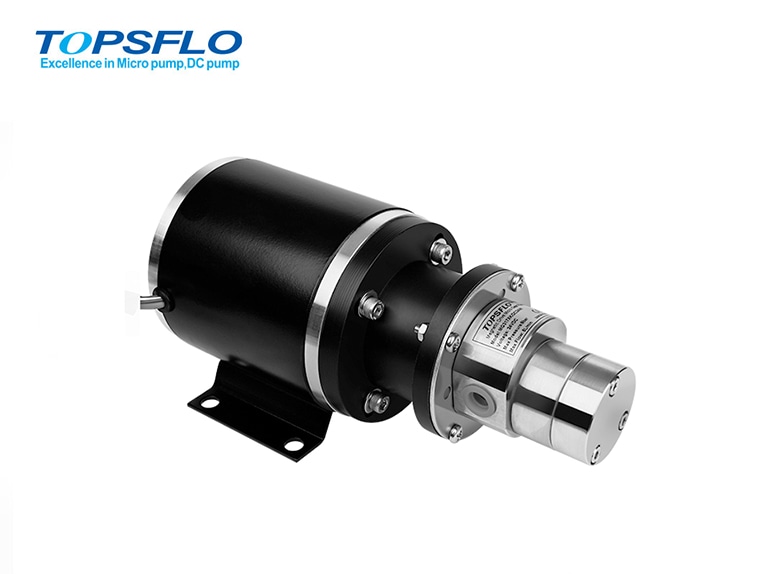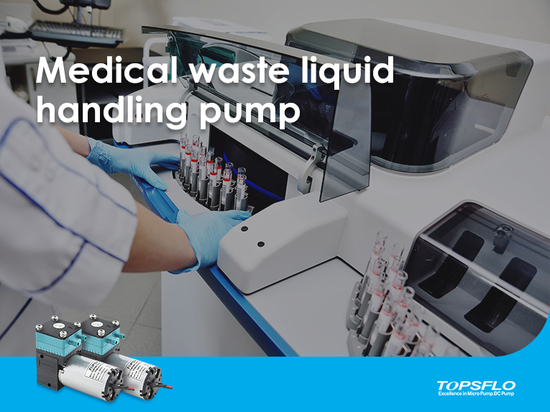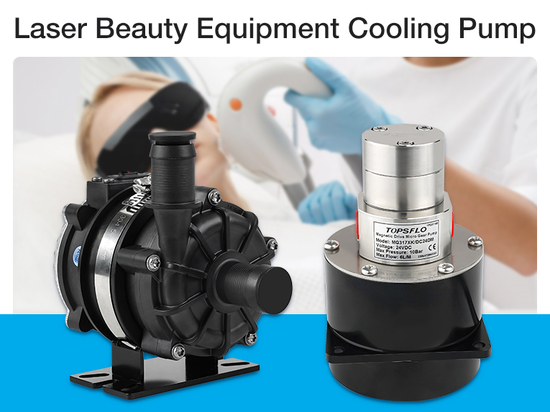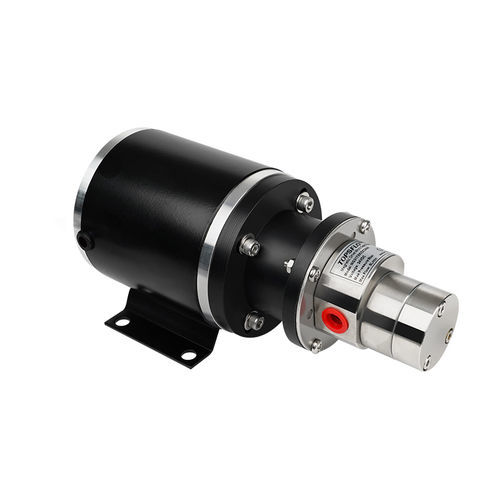
#Product Trends
How to choose a pump for in vitro diagnostic analysis?
In Vitro Diagnostic Analysis Medical Equipment Pump | TOPSFLO High-end Micro Pump Manufacturer
IVD, which stands for in vitro diagnostics, refers to products that conduct testing on samples taken from the human body (such as blood, body fluids, and tissues) outside of the body in order to obtain clinical diagnostic information. The IVD industry is subdivided into various sectors including immunodiagnostics, clinical chemistry, molecular diagnostics, microbiology diagnostics, blood diagnostics, and point-of-care testing (POCT).
With the improvement of people's living standards, there is an increasing emphasis on personal health. This has further fueled the robust development of the IVD industry. However, looking at the current market landscape of IVD, a group of five multinational giants, each with a market share exceeding 5%, constitutes the first tier of the domestic IVD industry. Together, they hold a total market share of 36.8% in the domestic market. The breakthrough in domestic key technologies and components has become a critical factor for the rapid enhancement of market share and technological capabilities among domestic IVD enterprises.
· TOPSFLO Solution
Micro pumps are a crucial driving component for in vitro diagnostic analysis. They serve as the power elements of fluidic systems and are extensively used in various fields such as clinical chemistry, blood analysis, immunology, microbiology, etc. Micro pumps perform essential functions including sample delivery, waste removal, pipeline and component cleaning. TOPSFLO micro pumps have successfully replaced Japanese and German pumps, contributing to the localization of pump manufacturing for multiple enterprises.
Taking the Fully automated biochemistry analyzer as an example, TOPSLFO micro pump can be used in systems such as needle cleaning, cuvette washing, and constant temperature circulation.
- Centrifugal pump
TOPSFLO centrifugal pumps are commonly used in IVD circulation constant temperature systems to regulate the temperature of in vitro diagnostic reagent kits, enzyme-linked immunosorbent assay (ELISA) instruments, fluorescence analyzers, and more. This ensures the accuracy and reproducibility of experiments. Commonly used products include: TL-B10-C、TL-C01-E、TL-C01-F.
The following are the requirements for pumps in the IVD circulation constant temperature system:
1.Reliability and Stability
The IVD equipment demands highly reliable results, requiring centrifugal pumps to exhibit high stability to ensure continuous operation without any failures. Furthermore, within the IVD instrument's lifespan of 10 to 15 years, it is expected that the micro pumps do not require replacement. TOPSFLO pumps have successfully passed reliability validation from major domestic IVD manufacturers, demonstrating a long lifespan and stable reliability.
2.Zero Cross-Contamination
In the IVD system, cross-contamination can lead to errors and inaccurate results. For instance, deionized water within the system needs to possess high purity to ensure that the flowing water does not contaminate samples or reagents. Additionally, the pump itself must avoid releasing even trace amounts of pollutants. TOPSFLO pumps utilize food-grade materials, achieving genuine zero impurities and zero cross-contamination. This approach contributes to medical equipment providing the most authentic and reliable test data.
3.Corrosion Resistance
Alkaline cleaning solutions possess a certain level of corrosiveness, requiring pumps to be corrosion-resistant to prevent damage during the handling process. TOPSFLO employs corrosion-resistant materials and has successfully passed alkaline cleaning solution immersion tests conducted by various major IVD manufacturers.
- Diaphragm pump
Diaphragm pumps are the most widely used pumps in IVD instruments, especially in waste systems, where they clean and eliminate waste from reaction cups and pipelines. In this process, diaphragm liquid pumps can directly pump out waste liquids. Alternatively, miniature vacuum pumps can be used to create a vacuum in sealed containers, indirectly drawing out waste from the instrument. This method is efficient and the waste doesn't pass through the pump chamber, thus extending the pump's lifespan.
Depending on the specific application, there are larger double-headed and single-headed vacuum pumps used to create a vacuum in containers, as well as smaller diaphragm pumps with lower flow rates and pressures. Small diaphragm pumps are often employed to directly extract waste from individual needles. Miniature pumps need to operate under various working pressures, meeting the demands of different pressure and flow scenarios.
1.Zero Cross-Contamination
Providing a clean environment for the transfer, extraction, and compression of gases; oil-free and maintenance-free
2.High air-tightness
Highly airtight diaphragm pumps are crucial for IVD equipment because they ensure the precision, reliability, and repeatability of tests, thus supporting accurate diagnostics and analysis.
3.Corrosion resistance
When flushing pipelines and needles, corrosive solvents are often used, and it's necessary to promptly remove waste containing crystals or blood clots from the system. Therefore, miniature pumps need to possess a certain level of corrosion resistance. The pump head, diaphragm, and valve components of TOPSFLO diaphragm pumps can all be customized with a variety of materials to accommodate different solvents.
4.Precise flow rate
IVD systems rely on highly reliable sample introduction systems to complete processes such as sample pretreatment, sample/reagent addition, and more. It's crucial to ensure the high-precision and high-repeatability conveyance of samples and reagents, along with maintaining smooth flow and minimal pulsation in the process.
5.Compact structure Flexible installation
IVD systems typically need to accommodate other critical components such as sensors, valves, and reservoirs. With limited space for equipment and components, there is a requirement for miniature pumps to have a compact structure and flexible installation capabilities.
6.Extremely long product lifespan
Within the lifecycle of IVD instruments, there is a requirement for miniature pumps to not require replacement, to have a long operational lifespan, and to maintain stability and reliability.
- Gear pump
Gear pumps are commonly used for cleaning the inner walls of needles with high pipe resistance. The cleaning effectiveness of the needle is closely related to the internal roughness and design of the inner needle wall, but more importantly, it's correlated with the high pressure provided by the gear pump. High-pressure flushing of the inner walls ensures an adequate cleaning flow even under high resistance conditions.
The following are the requirements of IVD equipment for gear pumps:
1.Stable pressure output
Gear pumps should be capable of providing a stable pressure output to ensure the flushing force of liquids within the system.
2.Precise flow control
IVD equipment typically requires precise flow control to ensure accurate dosing, mixing, and transfer of reagents, samples, or other liquids. TOPSFLO gear pumps possess stable flow control capabilities to meet experimental requirements.
3.Corrosion resistance
IVD equipment may use various types of reagents and samples, some of which might be corrosive. The materials of TOPSFLO gear pumps are designed to withstand the characteristics of the liquids used to prevent pump damage during operation.
4.Reliability and durability
Gear pumps need to have high reliability, capable of continuous operation over extended periods, and maintaining performance stability throughout the equipment's entire lifespan.







